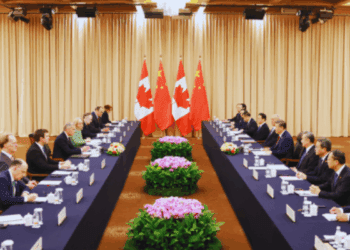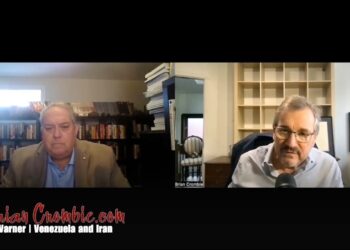MLI’s ground breaking papers on resetting the relationship between Aboriginal and non-Aboriginal Canadians continues to attract substantial media interest. On May 1, 2013 MLI released two papers; “New Beginnings: How Canada’s Natural Resource Wealth Could Re-shape Relations with Aboriginal People” by Ken Coates and Brian Lee Crowley, and “Canada and the First Nations: Cooperation or Conflict?” by Douglas Bland.
Warning signs for aboriginal uprising
John Ivison, National Post, May 2, 2013
Mankind is at a crossroads, Woody Allen once quipped: “One path leads to despair and utter hopelessness.The other to total extinction. Let us pray we have the wisdom to choose correctly.
“Canada’s relations with its aboriginal people are also at a crossroads but, fortunately, one of the potential pathsforward promises a more auspicious outcome than Mr. Allen’s doomsday scenario.
The Macdonald−Laurier Institute think−tank laid out the options in two important essays releasedWednesday. One paper, by Ken Coates and Brian Lee Crowley, outlines an optimistic vision where aboriginaland non−aboriginal Canadians find ways to collaborate on natural resource development, to the benefit of all.
A more pessimistic report, by Douglas Bland, suggests that Canada has all the necessary “feasibility”conditions for a violent native uprising − social fault lines; a large “warrior cohort”; an economy vulnerable tosabotage; a reluctance on the part of governments and security forces to confront aboriginal protests; and asparsely populated country reliant on poorly defended key infrastructure like rail and electricity lines.
Mr. Coates and Mr. Lee Crowley suggested that aboriginal people are in a “sweet spot” when it comes tonatural resource development − the result of treaty agreements, court settlements and Supreme Courtdecisions.
Mr. Coates said many First Nations have made it clear they want to work within the structure of Canada bytaking their grievances to court, a process that culminated with a landmark Supreme Court decision in 2004that said companies who want to develop resources on traditional native land have a “duty to consult andaccommodate.” This gives aboriginal people substantial influence over resource decisions, if not a legal veto,and has led to the emergence of well−funded community development corporations, impact−benefitagreements, indigenous collaboration and resource revenue sharing. (British Columbia has led the way with anew mineral tax.)
The authors point out these kinds of deals are not a panacea − the troubled Attawapiskat reserve has aroyalty−sharing agreement with de Beers over its Victor diamond mine, yet has recently seen a state ofemergency declared again.
But their conclusion is that even such movements as Idle No More−”overwhelmingly peaceful and culturally rich” − suggest accommodation is possible, if native Canadians receive a “fair” share of the country’s wealth.
That’s the good news. There’s precious little sunshine in Douglas Bland’s paper, Cooperation or Conflict?
He took the accepted “feasibility” hypothesis, developed by researchers at Oxford university, as the basis for predicting civil unrest and applied it to Canada. The findings are scary enough to make you stock up on canned food and start digging your bunker.The Oxford research suggests that “feasibility,” rather than root causes, is the foundation for challenging civil authority. In Canada, it seems, unrest is very feasible. “Social fractionalization” along native and non−native fault lines is obvious. There is a growing warrior cohort − by 2017, 42% of First Nations population on the Prairies will be under 30 − many disadvantaged, poorly educated, unemployed and angry. The economy is dependent on moving resources over long, hard−to−defend transportation routes. Finally, the security forces are limited by capacity and the will of their leaders to confront aboriginal protesters who break the law.
While the Oxford hypothesis suggests feasibility is the determinant and predictor of insurgency, it does not dismiss that grievances do provide motive. And Mr. Bland’s paper reels off some particularly damning statistics: a homicide rate of 8.8/100,000 compared with 1.3/100,000 in the non−aboriginal population; a stratospheric incarceration rate that means 80% of prisoners in Alberta are aboriginal (out of 11% of the population); a high school graduation rate of 24% of 15 to 24−year−olds, compared with 84% in the non−native population; a 40% youth unemployment rate and on and on.
Mr. Bland argues that, in some respects, an uprising has and is occurring, “as a quick head count of the Warrior Cohort inside our penal colonies will demonstrate.”
In the event of an insurgency, the Canadian economy could be shut down in weeks. The 2012 CP rail strike cost an estimated $540−million a week, as it hit industries including coal, grain, potash, nickel, lumber and autos. Some First Nations leaders like Terry Nelson in Manitoba have already concluded that a covert operation involving burning cars on every railway line would be impossible to stop.
Mr. Bland cites Manitoba, with its vulnerable transportation hub, as a province with a large native population and a relatively small police presence that would be unable to guarantee security in the event of even a modest protest. “The reality is that the security of Manitoba now and in the future is whatever the First Nations allow it to be,” he quotes one security specialist as saying. “[And] as the security guarantee drifts lower, the feasibility of confrontation climbs higher.”
It makes for grim reading, but Mr. Bland suggests there are ways to diminish the feasibility factor and create conditions for the happier outcome put forward by Messrs. Coates and Lee Crowley.
He suggested resource revenue−sharing; a Marshall Plan style reconstruction package that acknowledges some sort of native sovereignty; programs aimed at dealing with aboriginal incarceration; comprehensive resettlement of remote communities; and a well−funded First Nations leadership institution as ways to address some of the frustrations felt by natives on reserves.
But the logic of the feasibility hypothesis means the most effective way to prevent an insurrection is to make one less feasible. hence, he concludes Ottawa must reinforce the security guarantee in and near First Nations by safeguarding critical transportation infrastructure, beefing up policing on reserves and cracking down on illegal drugs.
In his conclusion, Mr. Lee Crowley said that, on balance, there are strong reasons for optimism. “The feeling that this is an intractable problem where progress can never be made is not true,” he said.
But, having read both papers, I tend to side with Mr. Allen’s (and perhaps Mr. Bland’s) more gloomy world view.




